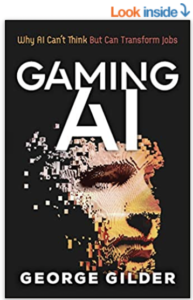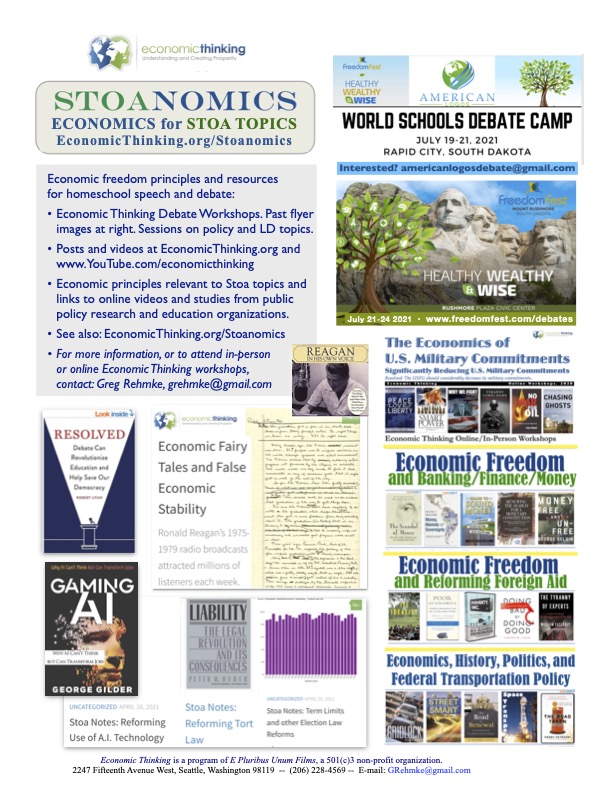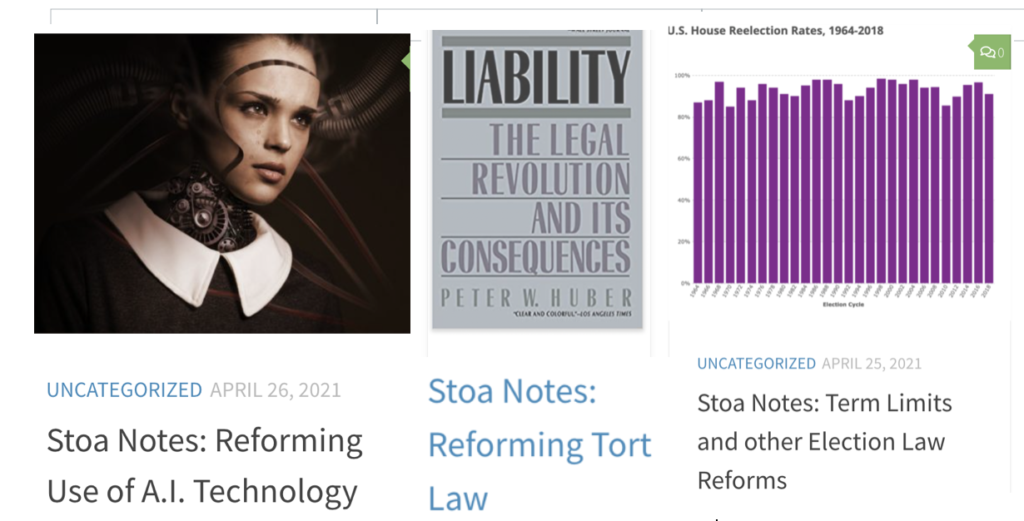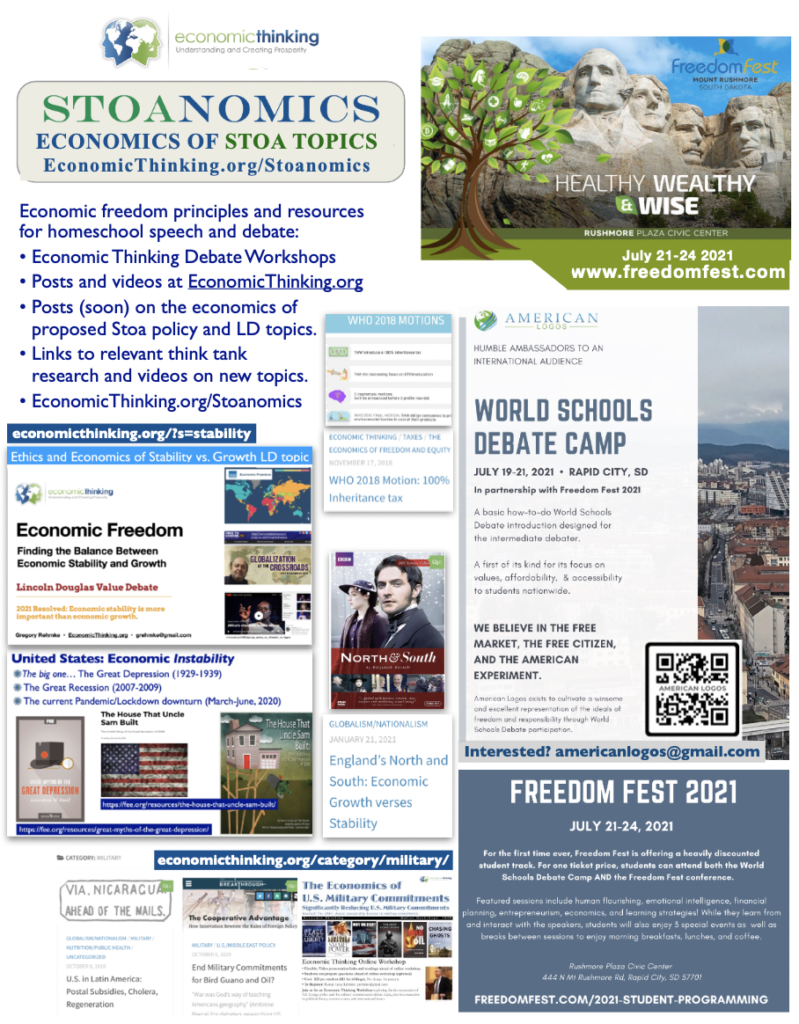Economic Thinking resources for Stoa speech and debate league…

Gaming AI: Why AI Can’t Think but Can Transform Jobs by George Gilder
For decades, George Gilder has been one of America’s most prophetic writers about economics, technology, and the future. Now he has written Gaming AI, a short incisive book explaining how artificial intelligence (AI) will—and won’t—revolutionize the economy and human life….
Get George Gilder’s New Book Gaming AI: Why AI Can’t Think but Can Transform Jobs
• BPF Book Review “Gaming AI: Why AI Can’t Think But Can Transform Jobs” (Bigger Pie Forum, November 17, 2020)
• Artificial Intelligence: Is It Coming to Get You? (American Consequences, June 2019)
Who’s afraid of AI? Too many of us. Particularly since Boeing’s computerized pilot started flying airliners into the ground. But our fears have less to do with the dangers of artificial intelligence than with the limitations of natural intelligence – the circuits in our brain that keep us worried about imaginary threats.
It’s not that the AI doomsayers are stupid. Some of them are quite smart. Elon Musk, who called AI “far more dangerous than nukes,” knows enough rocket science to send a SpaceX payload into orbit. The late Stephen Hawking, who warned that AI “could spell the end of the human race,” knew his cosmology. But they aren’t in the business of building AI. The people who do that have a hard time imagining a robot capable of controlling one screaming toddler, much less taking over the world.
• Human Compatible: Artificial Intelligence and the Problem of Control by Stuart Russell [a review] (Cato Journal, Spring 2020)
• Artificial Intelligence Will Kill Jobs – and Create Them (HumanProgress, October 30, 2019)
Ever since the Industrial Revolution, the automation of tasks once done by humans has raised fears about machines putting humans out of work and creating mass poverty. Happily, history has repeatedly proven the doomsayers wrong. While automation has certainly led to declines in entire industries (and employment in those industries), the relationship between automation and overall employment growth has been strongly positive over time.
There are sound explanations for this positive relationship. One, automation increases labour productivity and therefore raises the income levels of workers. Resulting increases in income translate into increased demand for all types of goods and services, which obliges businesses to hire additional workers. Second, automation directly increases the demand for labour skills that are complementary to the development and efficient use of new technologies.
• Privacy Preserving AI – Andrew Trask, OpenMined (November 6, 2019)
Privacy Preserving AI (Andrew Trask) | MIT Deep Learning Series – Lecture by Andrew Trask in January 2020, part of the MIT Deep Learning Lecture Series.
• Andrew Trask, Building Safe A.I.: A Tutorial for Encrypted Deep Learning, Posted by iamtrask on March 17, 2017
• From AI to UBI? (American Institute for Economic Research, May 4, 2021)
• The Right Not to Get Matched (AIER, March 31, 2021)
• AI Can Now Debate with Humans and Sometimes Convince Them, Too (Scientific American, May 17, 2021)
Not unlike its human counterpart, the AI was given only 15 minutes to research the topic and prepare for the debate—rifling through thousands of gigabytes of information at record speed to form an opening statement and layer counterarguments that were later delivered through a robotic female voice, in fragments and with near perfect diction.
Online are articles on Accenture AI Services – Artificial Intelligence, Lockheed Martin – The Future of AI Technologies, Amazon Artificial Intelligence – Free AI Services With AWS.

New Post!
• Ronald Reagan radio address relevant to both reducing military commitments and economic stability vs. growth: Economic Fairy Tales and False Economic Stability
• Frédéric Bastiat (author of The Law) essay relevant to military commitments and economic stability topics: Algeria and The Demobilization
To learn more about Economic Thinking summer debate camp presentations and fall workshops on the economics of policy and LD debate topics, contact Greg Rehmke: grehmke [at] gmail.com
Updated NITOC flyer for “Stoanomics” and FreedomFest/American Logos World Schools Debate Camp.

Economic Thinking posts with notes on proposed Stoa policy topics:
Discussion of and resources for proposed 2021-22 Stoa policy topics:

• Stoa Notes: Term Limits and other Election Law Reforms (April 25, 2021)
• Stoa Notes: Reforming Tort Law (April 25, 2021)
• Stoa Notes: Reforming Use of A.I. Technology (April 25, 2021)
• Posts on economics of foreign policy and military commitments.
• Posts on economic stability and economic growth LD topic.
• American Logos World Schools Debate Camp
July 19-21 ahead of FreedomFest 2021 in South Dakota! During FreedomFest, additional student programs will be available, and American Logos alumni showcase will feature policy debates.

•American Logos FreedomFest 2021 and the Student Debate Showcase
• American Logos World Schools Camp Flyer (pdf) (July 19-21)
• American Logos Alumni Showcase at FreedomFest flyer (pdf)
• FreedomFest Student Programming
• “Stoanomics” Flyer with American Logos@FreedomFest (pdf) (image below)

Online Documentaries for Speech and Debate Students
• Highly recommended The Commanding Heights: The Battle of Ideas- Episode One (Official Video). Who will control the commanding heights of the economy? This six hour documentary was, astonishingly, shown on PBS during Clinton administration. Importance of economic freedom and reforms during Carter/Reagan administrations and with Thatcher in UK. Also covers the fall of communism and importance of economic freedom reforms around the world. So good that Oregon Public Broadcasting refused to show the second two episodes!
• Documentaries from Free to Choose highly recommended. Especially Thomas Sowell, Johan Norberg, and Hernando de Soto documentaries. Topics range from globalization and foreign policy, to energy, transportation, space, and many other public policy areas.
